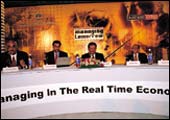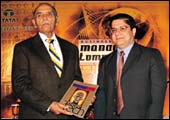 |
 |
| All in real time: (Top, L-R) M. Chugh
of CIsco, B. Pramanik of Sun, A. Kumar of HSS, A. Dani of Asian
Paints' and B.S. Nagesh of Shoppers' Stop (Bottom, L-R) F.C.
Kohli, former Chairman of TCS, and Ashish Bagga of Living Media
India |
Life
is run in real time. That business is not is a technical aberration."
The latest round in BT's Managing Tomorrow series, held on March
14 at Mumbai's Taj, went quite some way towards correcting that-by
subjecting this concept to the rigours of top-level scrutiny.
"The borderless world of free trade will
force governments, companies and society to learn to operate and
manage real time," said S. Padmanabhan, Senior VP, TCS, an
event co-sponsor, elaborating the transformations that have already
been wrought in Indian banking, stock trading and financial services.
The scope for real time operations, however,
extends to any and everything to do with information. And the division
of the economy into 'old' and 'new' is meaningless, now that real
time managing is a demand of business, per se. Even hamburger chains,
after all, can use the precision of a global positioning system
(GPS).
The event also saw the release of BT's special
issue, 'The New Tech', by F.C. Kohli, who urged the industry to
watch China.
 Arun
Kumar Arun
Kumar
President and MD, Hughes Software Systems
To Arun Kumar,
technology has much to offer by way of "speed of learning".
In dealing with the stresses caused by the "learning spiral",
he said, we either go the classical way, addressing environmental
changes in a reactive manner, or in "creator mode", which
requires competency-mapping and application, towards the creation
of "an economic system that can get things done, keeping other
things constant like building relationships and core values".
Don't get caught in the boom-to-bust cycles,
Kumar advised his listeners, urging all to use Real Time tools to
manage change, shape the company's future, assess demand, build
customer relationships, build a work culture and provide value-based
leadership. Technology can do it. Not just that, "Technology
can play a role in innovation, and can be used as an accelerator."
Manoj Chugh
Country Manager, Cisco Systems India Pvt Ltd.
 Success
of the real time economy is the confluence of two key forces-globalisation
and the ability to network information technology. These two create
unprecedented value in the Real Time economy," began Manoj
Chugh, speaking of how the internet can change the very way a business
functions, and citing an American study on the billions of dollars
that internet-transformed businesses have and could save. Plus,
"There have been significant enhancements in terms of productivity
as well as revenue gains-$430 billion of revenue gains, $130 billion
of cost savings. Add significant improvement in productivity, and
many of them are betting on the internet enabling more applications.
You will get super S-curve returns, provided you have patience."
Implementation strategy is crucial, he concluded. Success
of the real time economy is the confluence of two key forces-globalisation
and the ability to network information technology. These two create
unprecedented value in the Real Time economy," began Manoj
Chugh, speaking of how the internet can change the very way a business
functions, and citing an American study on the billions of dollars
that internet-transformed businesses have and could save. Plus,
"There have been significant enhancements in terms of productivity
as well as revenue gains-$430 billion of revenue gains, $130 billion
of cost savings. Add significant improvement in productivity, and
many of them are betting on the internet enabling more applications.
You will get super S-curve returns, provided you have patience."
Implementation strategy is crucial, he concluded.
Bhaskar Pramanik
MD, Sun Microsystems India
 Bhaskar
Pramanik took Sun Microsystems as an example to "turn this
managing in Real Time concept a little"-to place the customer
at the centre of the business universe. Success, he said, was largely
about understanding and managing, from a global perspective, the
changing patterns of demand. "How do you ensure that a customer
engineer who needs to fix a particular problem can draw upon the
resources of the rest of the organisation?" he asked, describing
how Sun is wired to operate on live information. "We can build
systems that handle a lot of the problems that are currently being
handled by humans-a system should be able to tell when it may collapse
and rectify the situation. That is key, since scalability is important." Bhaskar
Pramanik took Sun Microsystems as an example to "turn this
managing in Real Time concept a little"-to place the customer
at the centre of the business universe. Success, he said, was largely
about understanding and managing, from a global perspective, the
changing patterns of demand. "How do you ensure that a customer
engineer who needs to fix a particular problem can draw upon the
resources of the rest of the organisation?" he asked, describing
how Sun is wired to operate on live information. "We can build
systems that handle a lot of the problems that are currently being
handled by humans-a system should be able to tell when it may collapse
and rectify the situation. That is key, since scalability is important."
 B.S.
Nagesh B.S.
Nagesh
CEO, Shoppers' Stop
The paradigm for
us," said B.S. Nagesh, is one into one into one into one. One
customer in one moment, to sell one product from one square foot-there
is no alternative. In this one moment, we end up delivering a moment
of magic or misery. You cannot buy technology as a box, it has to
be geared for the customer."
Shoppers' Stop runs 12 stores that get 30,000
customers every day, and must coordinate with 300,000 suppliers.
"We are today a Rs 300-crore company, but when we invested
Rs 24 crore in it when our turnover was only Rs 80 crore, the world
wrote us off." Well, he's still busy changing the retail scene.
Soon-"If the shopper cannot reach the cash counter, I will
reach the cash counter to him."
Ashwin Dani
Vice Chairman and MD, Asian Paints
 Asian
Paints' affair with it goes back to the late 1960s, began Ashwin
Dani, recalling how lightly its efforts were taken then, and marveling
how well the early-mover advantage had served it. "We could
feel the pulse of the market," he explained. Asian
Paints' affair with it goes back to the late 1960s, began Ashwin
Dani, recalling how lightly its efforts were taken then, and marveling
how well the early-mover advantage had served it. "We could
feel the pulse of the market," he explained.
Knowing precisely what one wants of technology,
though, is critical to success. "You may have the best of technology,
but how to use the tools is also very important." For supply
chain management, the company went for a combination of an i2 tool
with sap's ERP. Today, the company is proud of how optimal its inventories
are and how smoothly it all functions-with all the complexity of
2,000 SKUs, four manufacturing plants, 75 stock-keeping places and
14,000 dealers to be invoiced. Savings? Some Rs 173 crore of working
capital.
|

